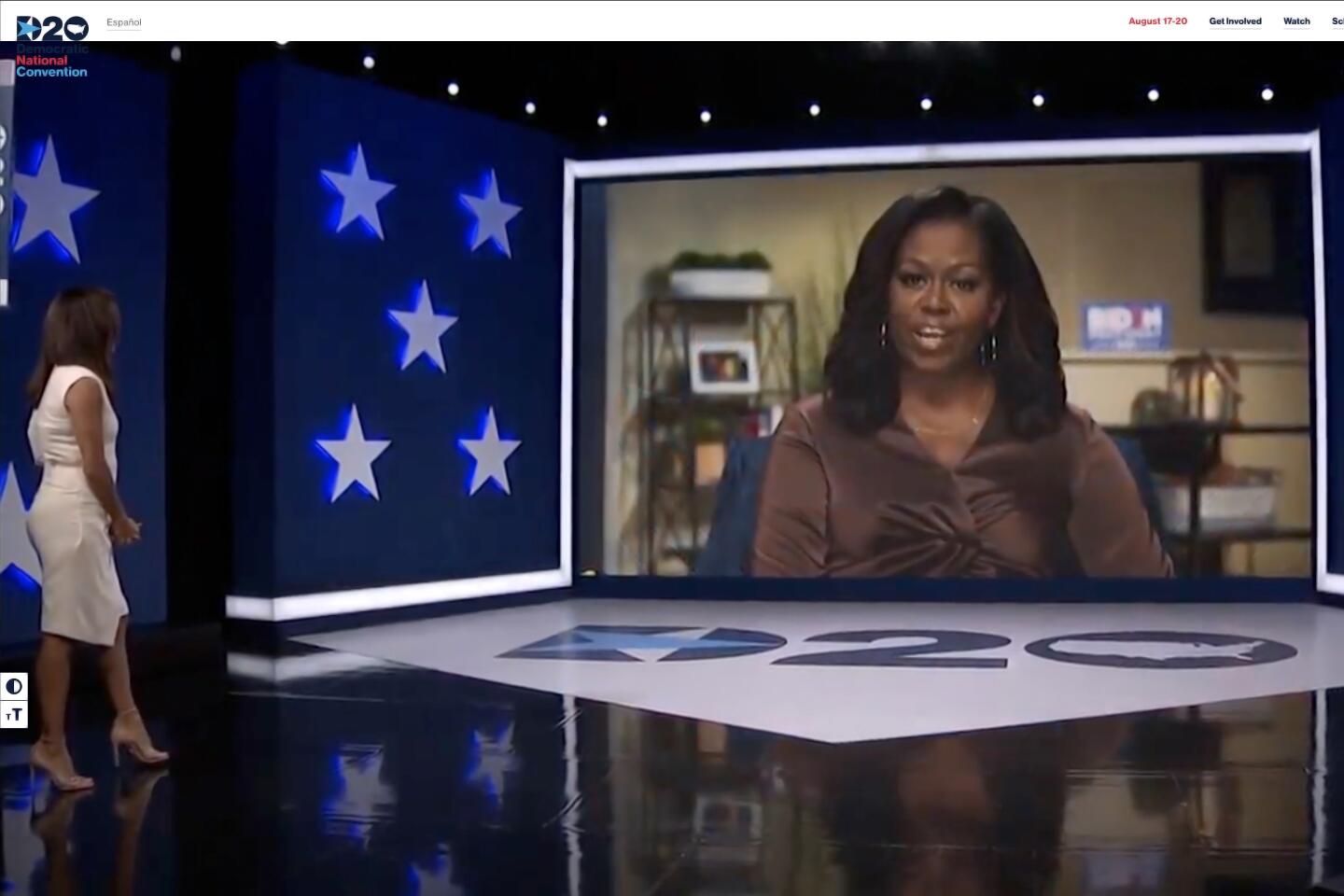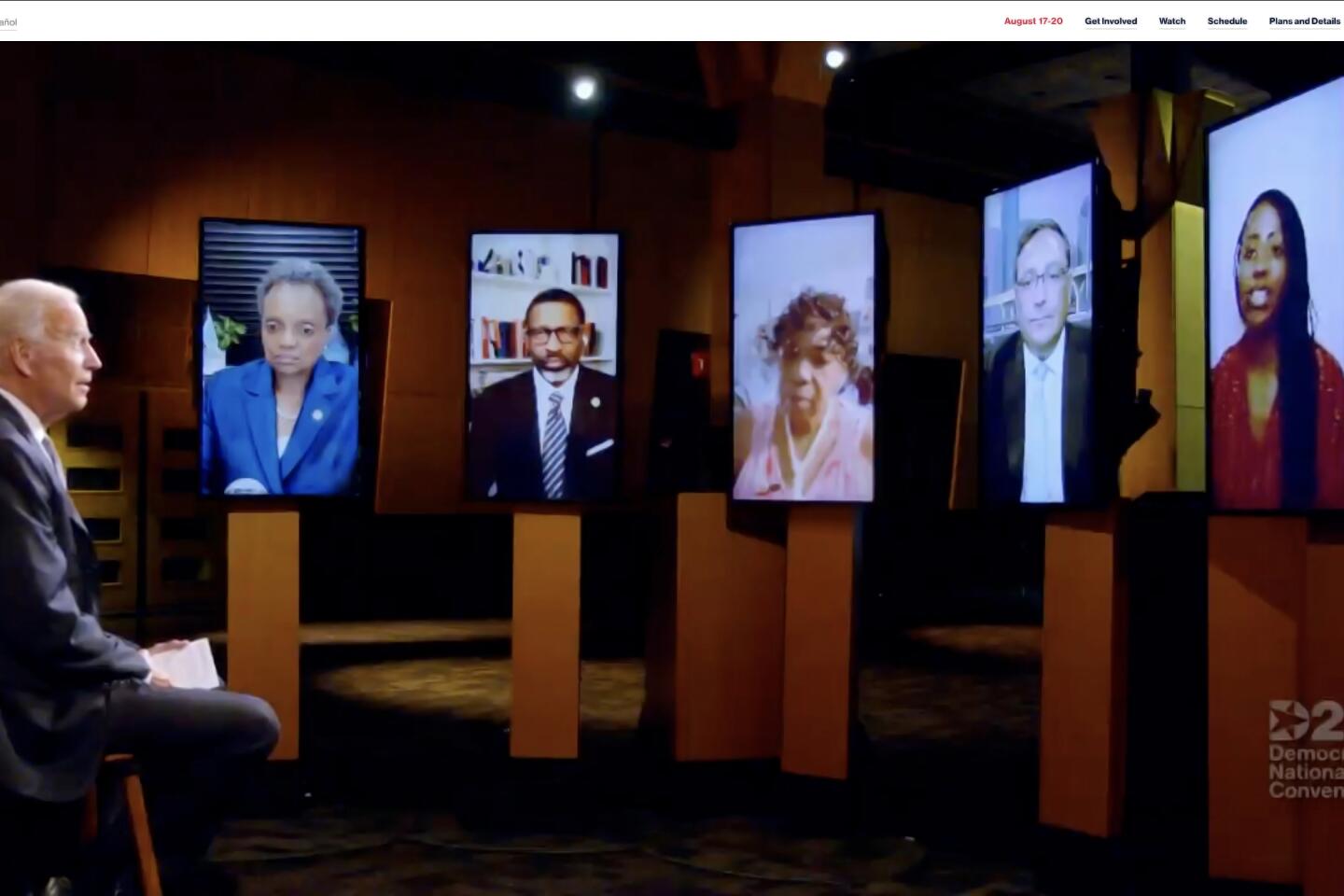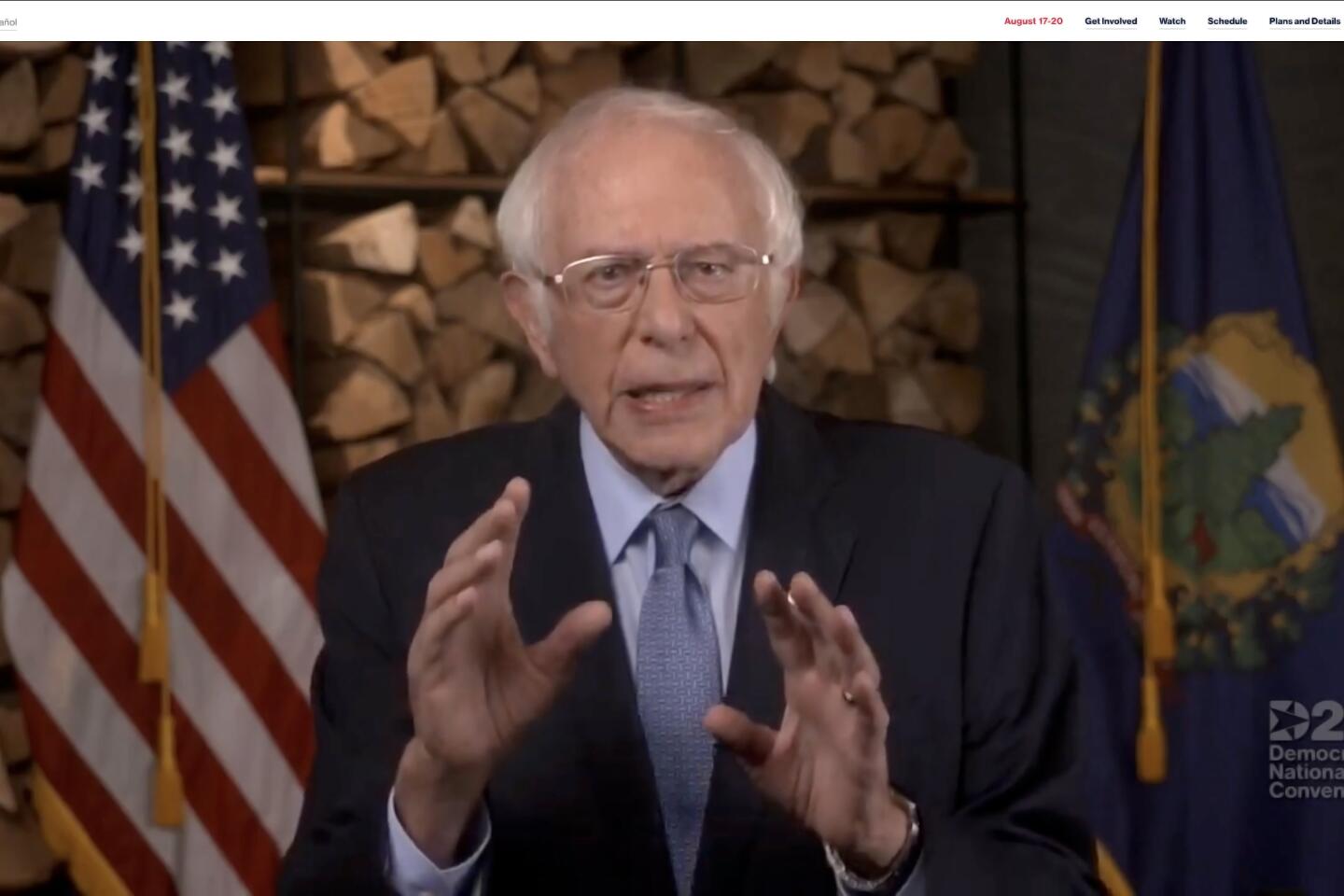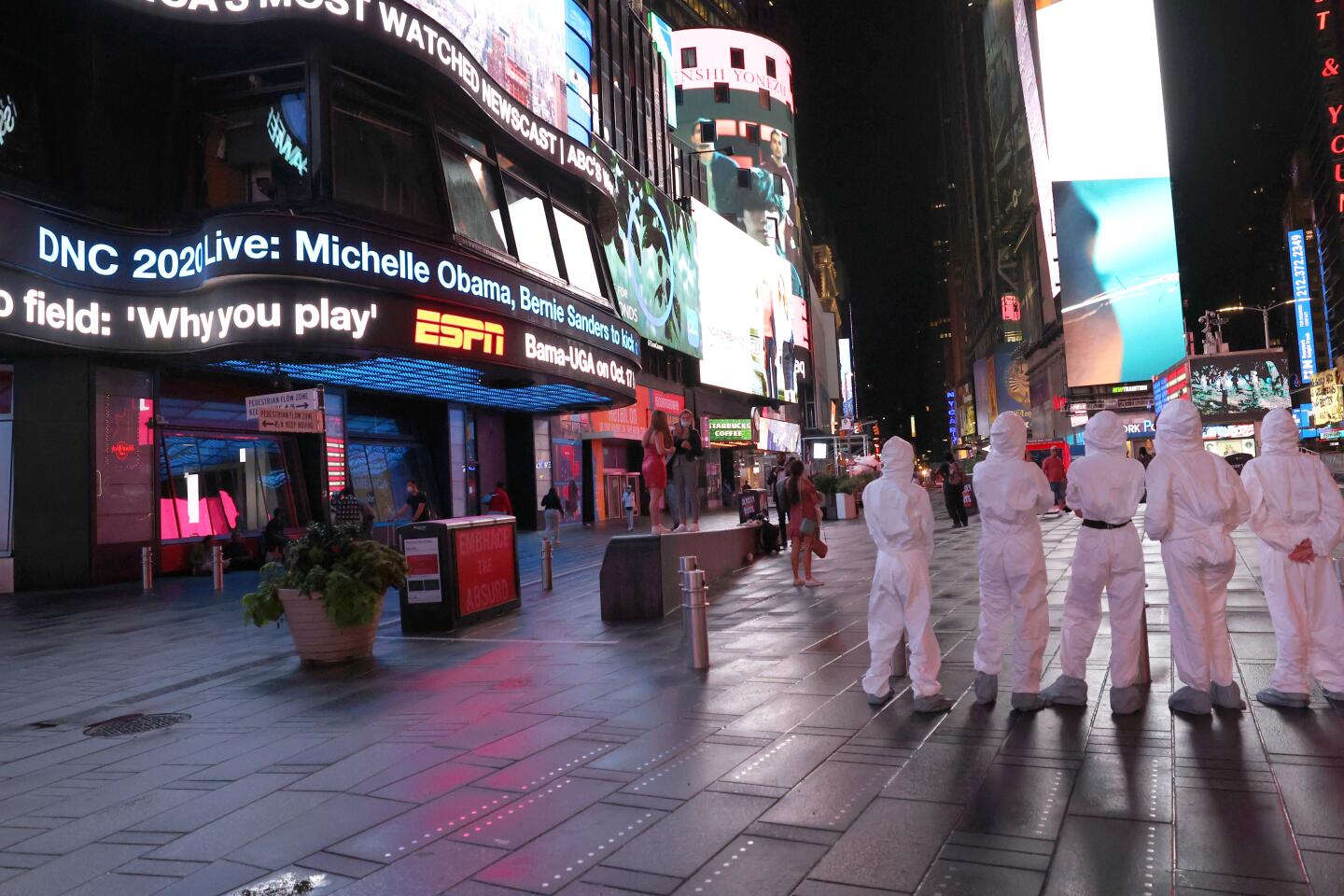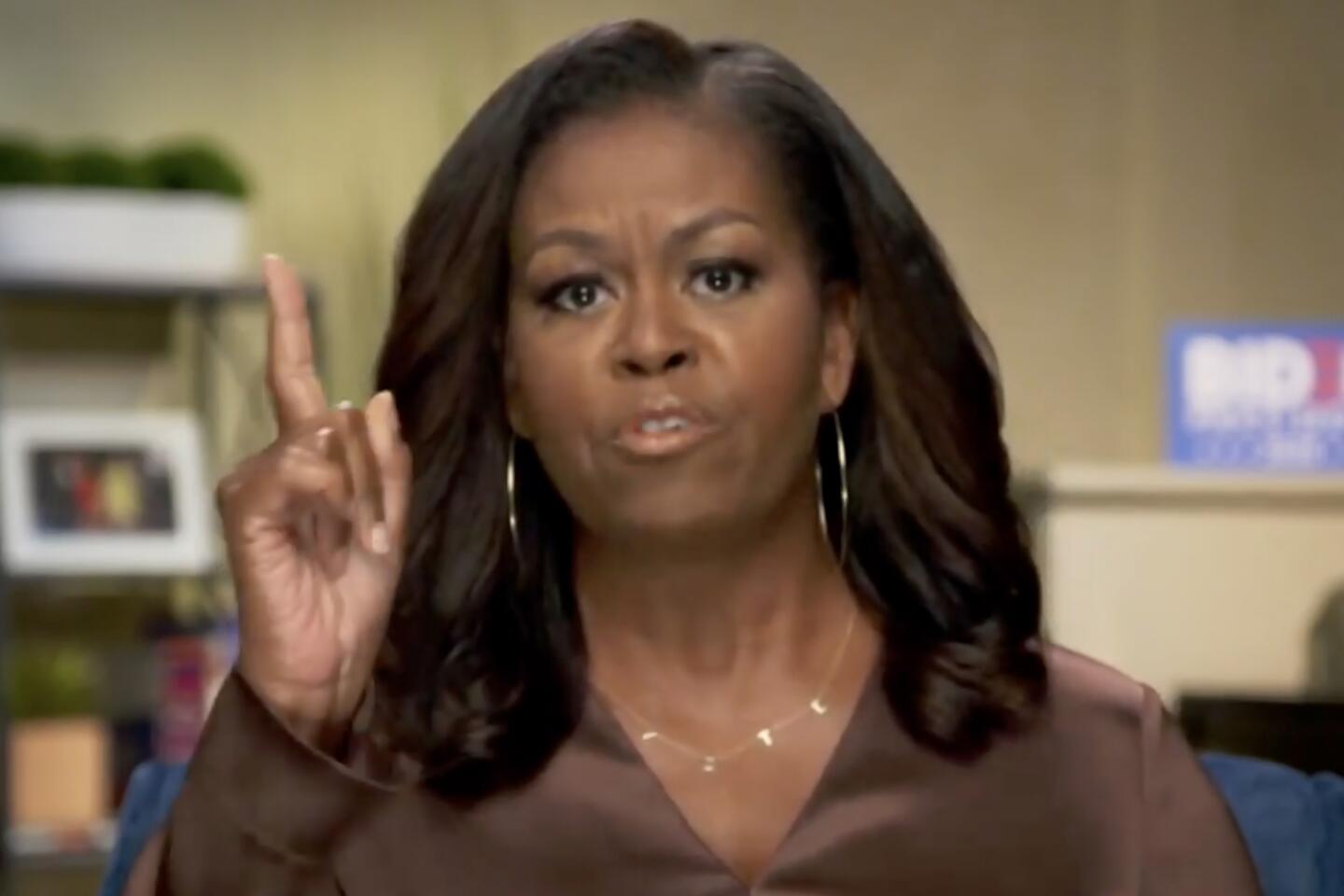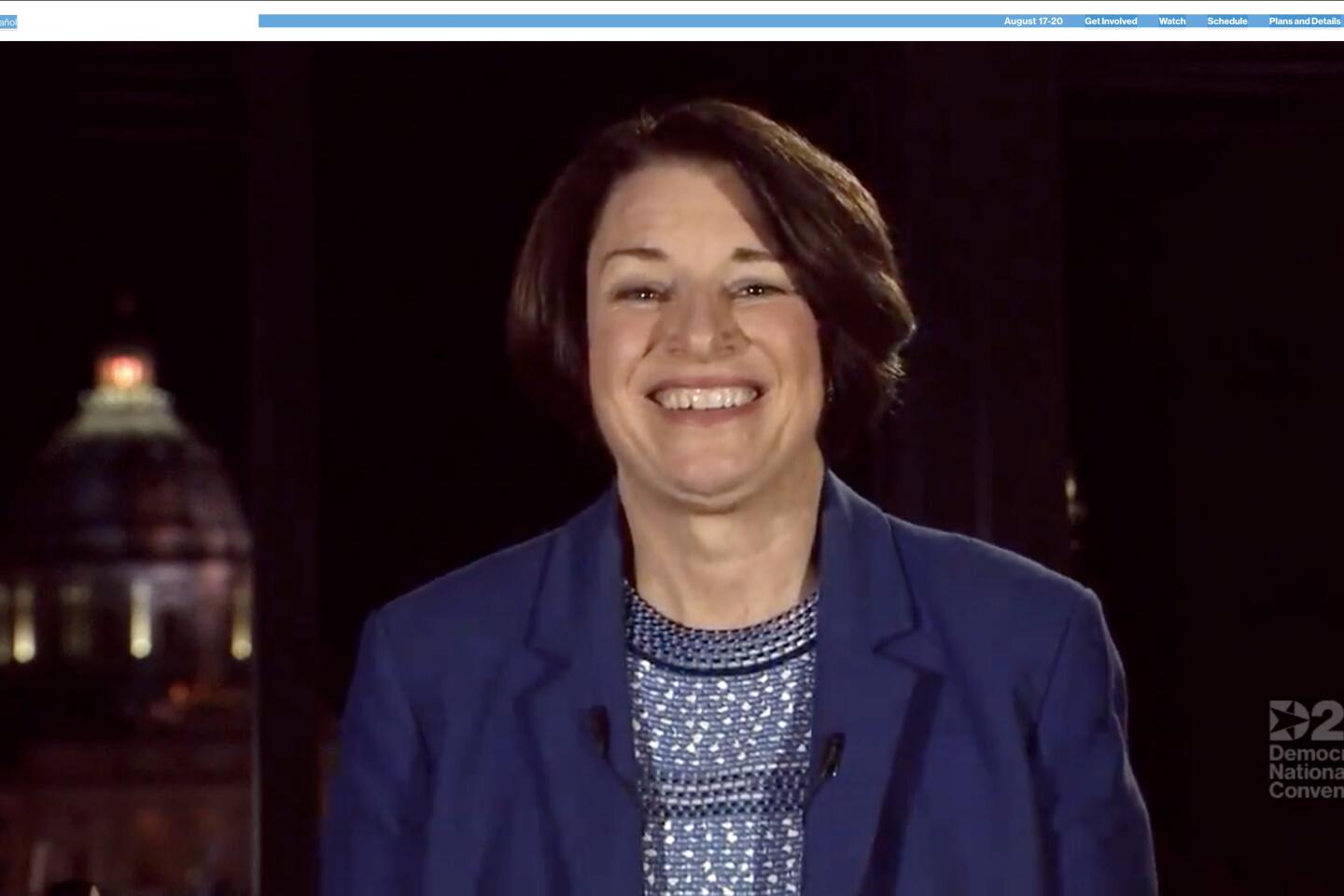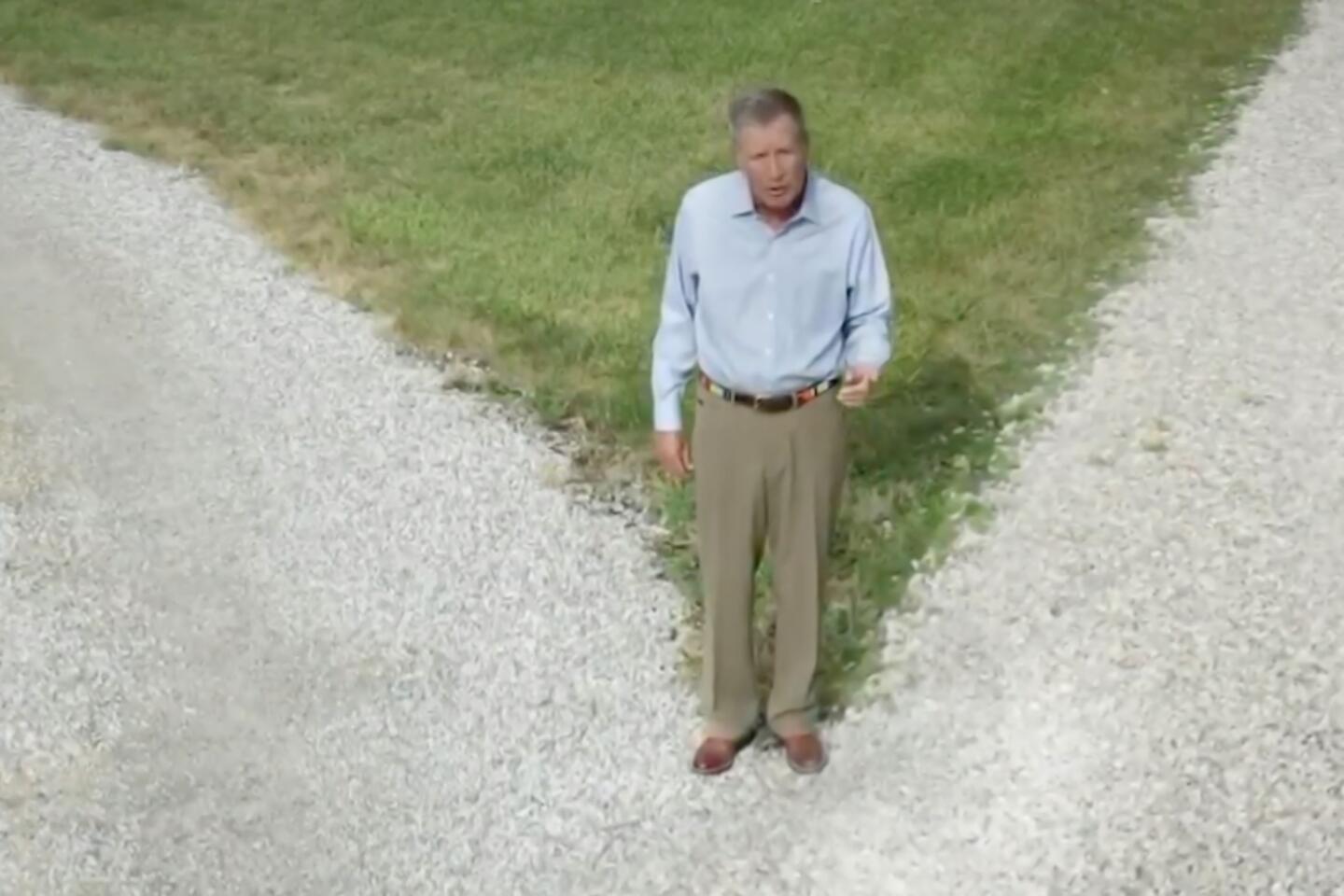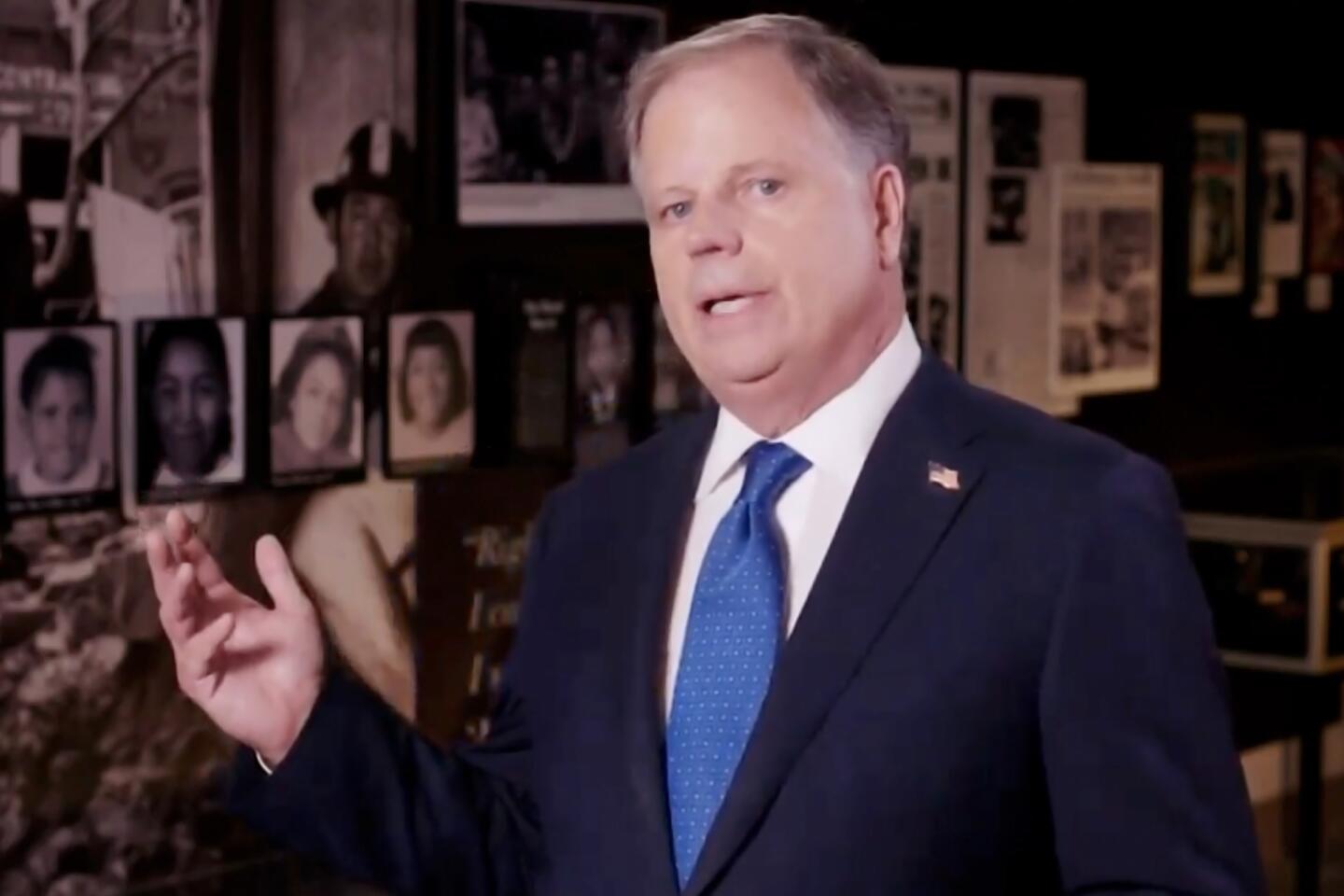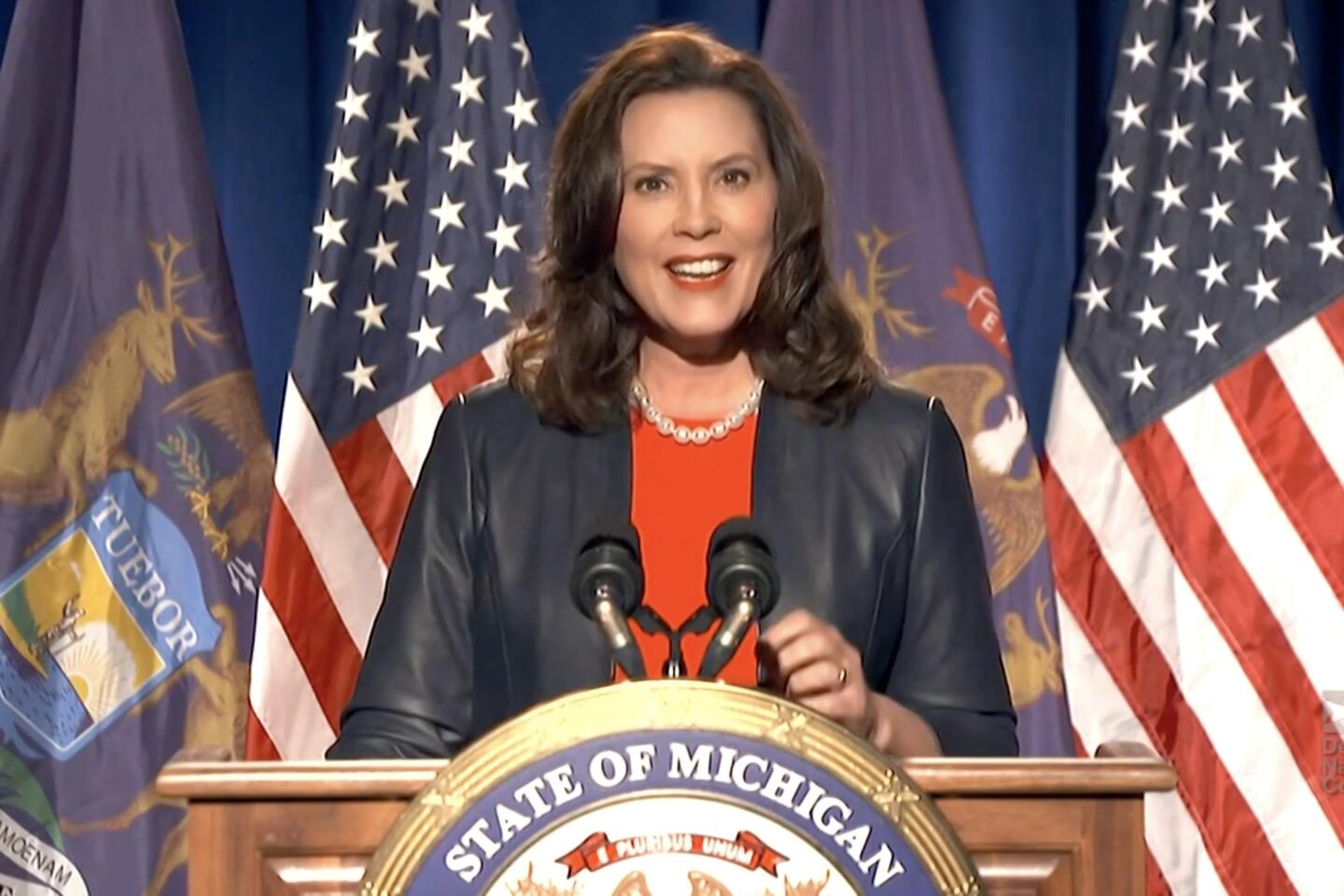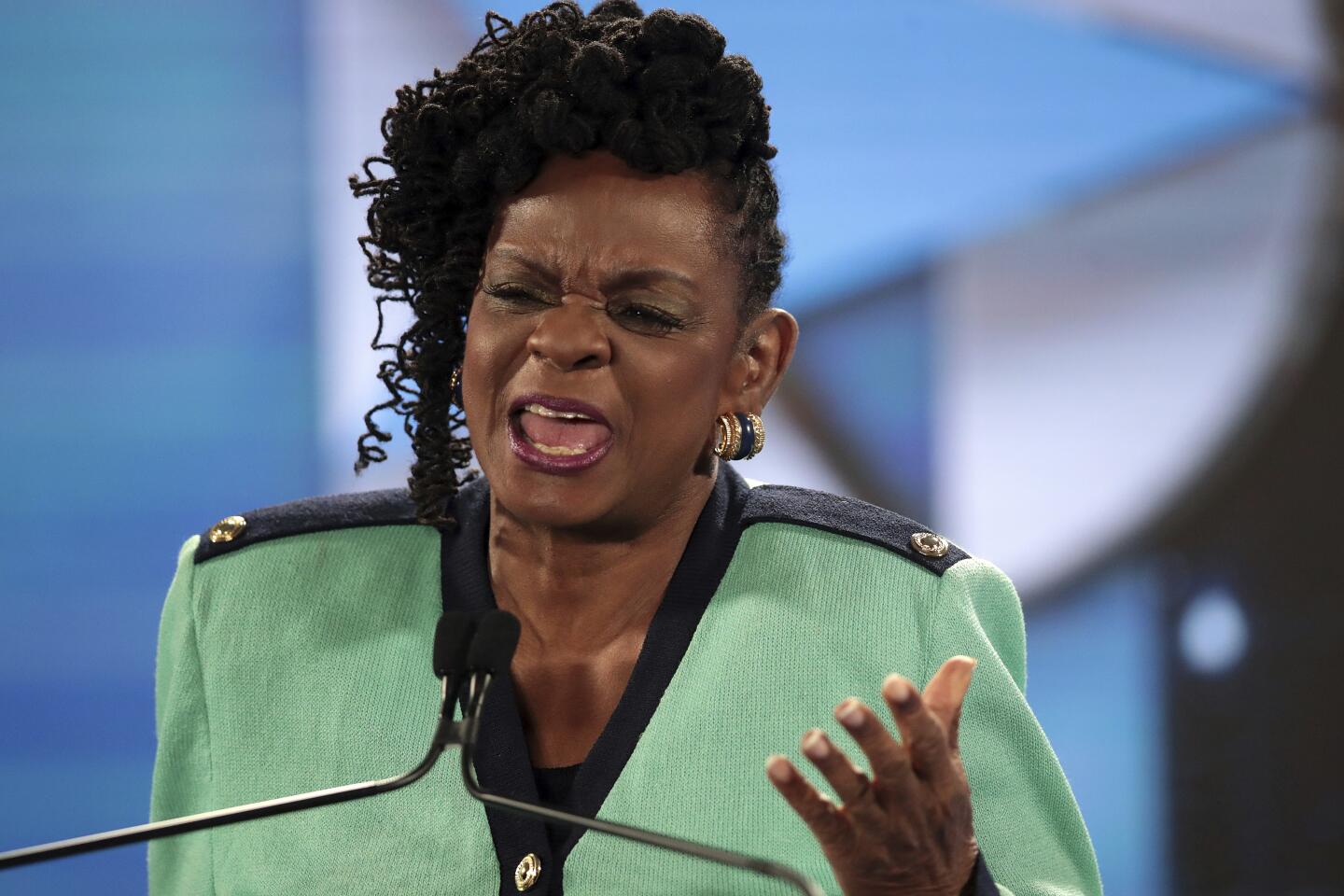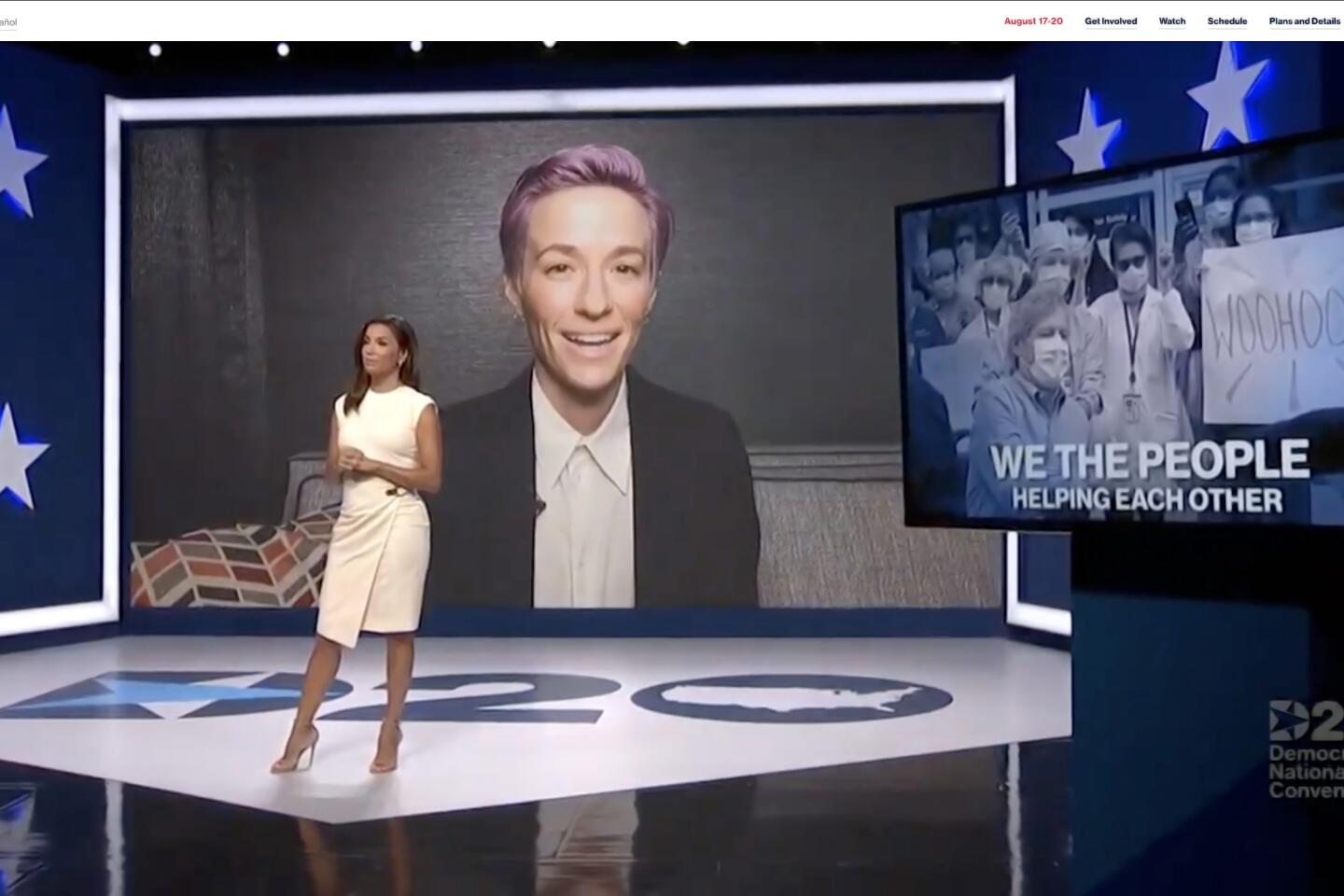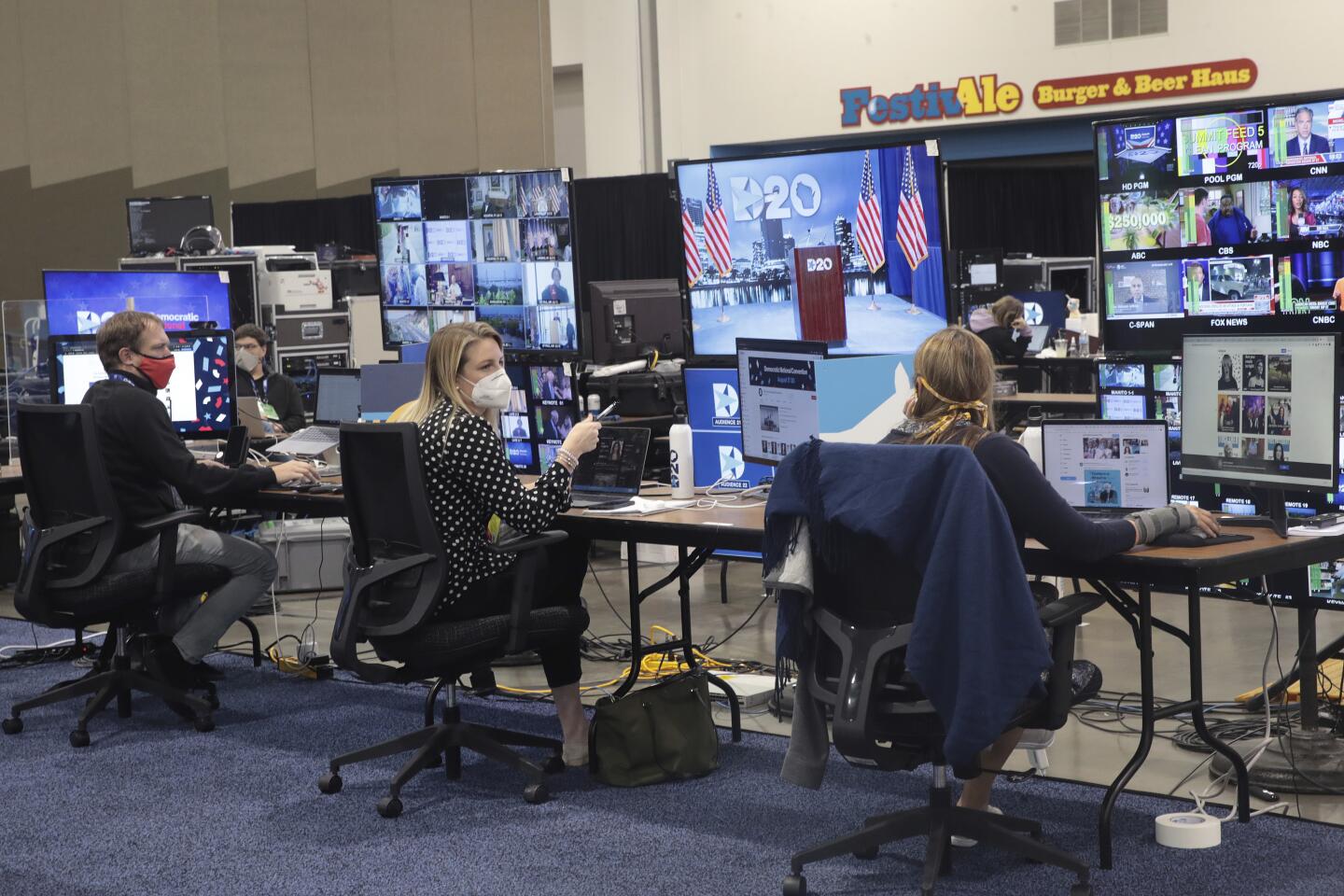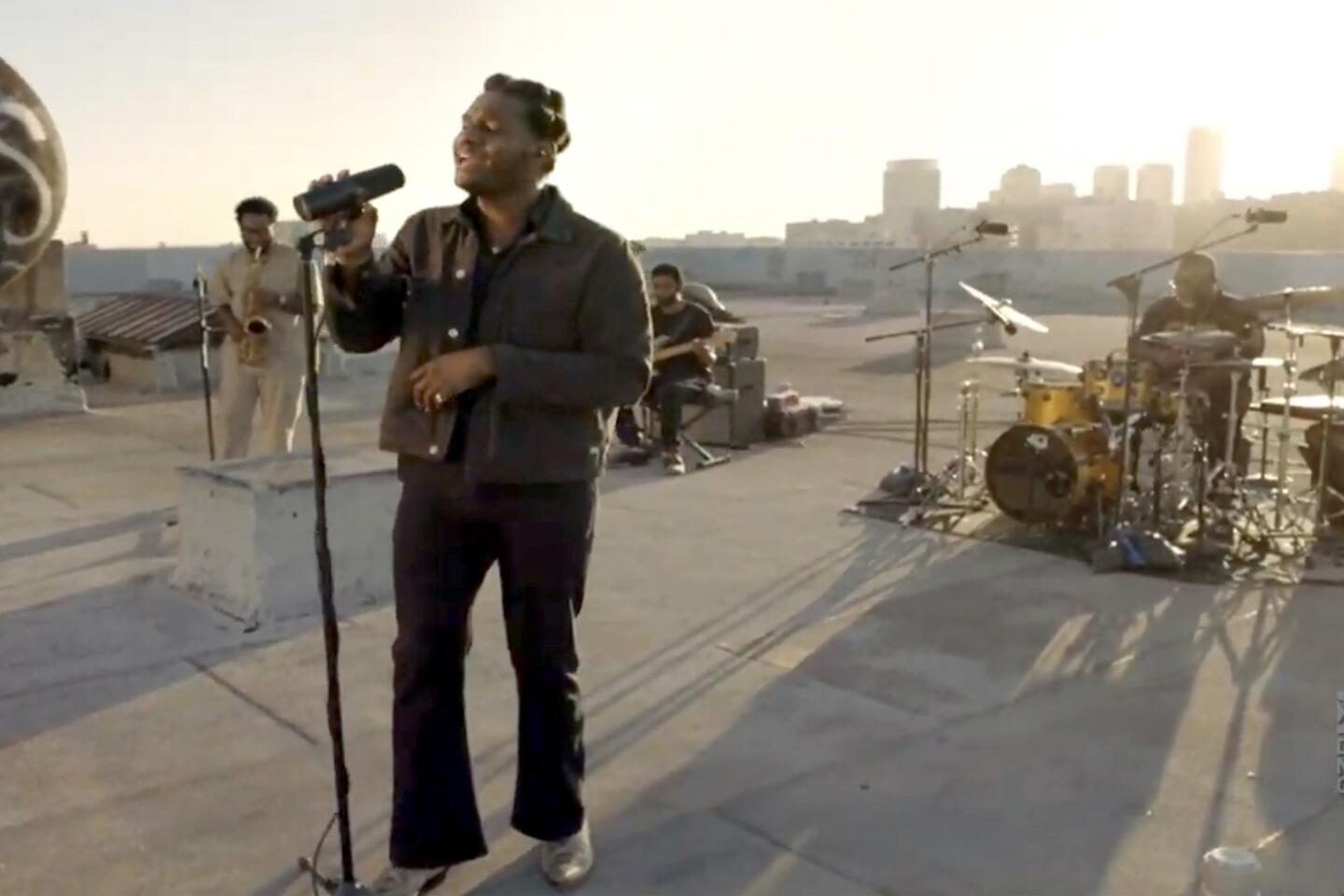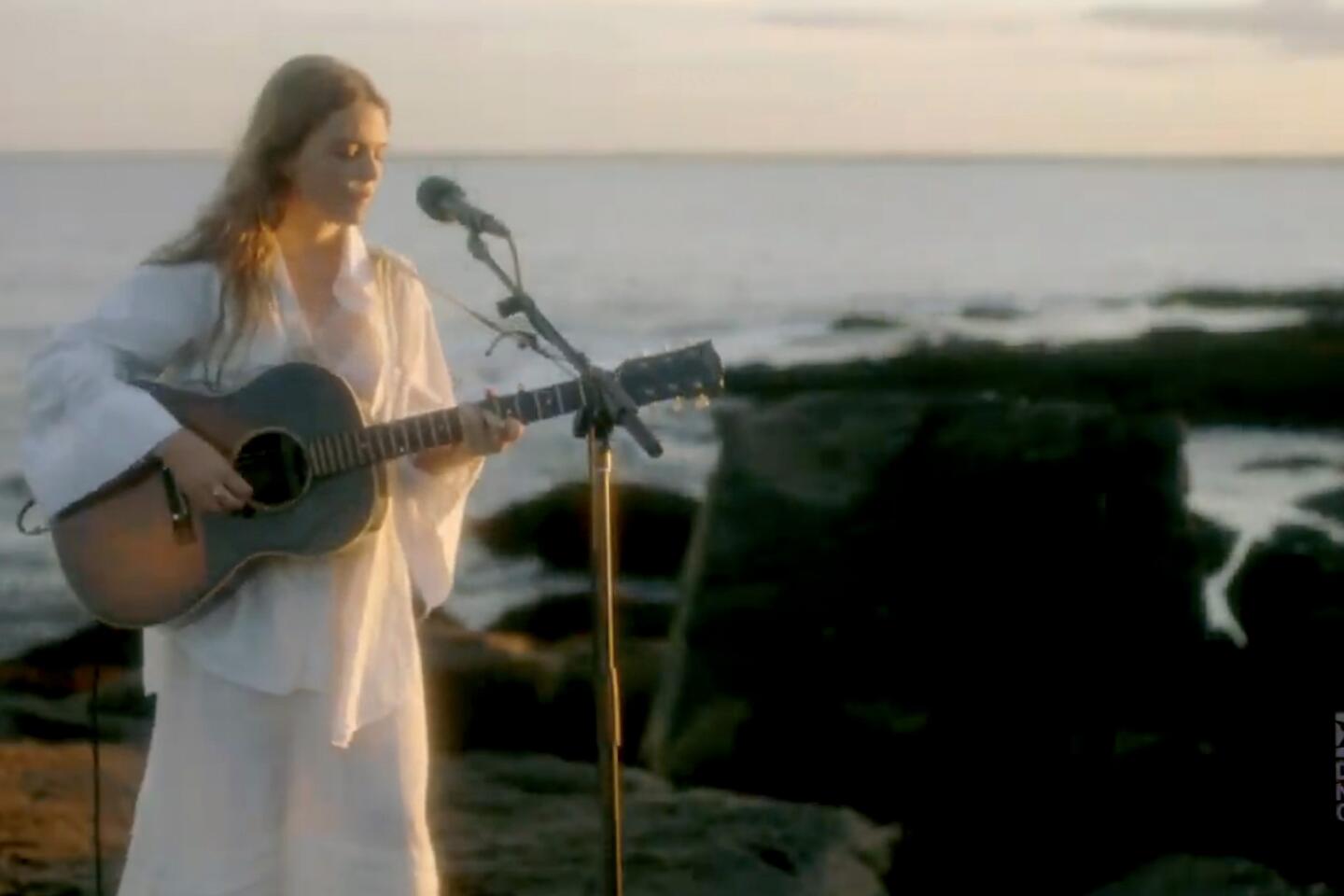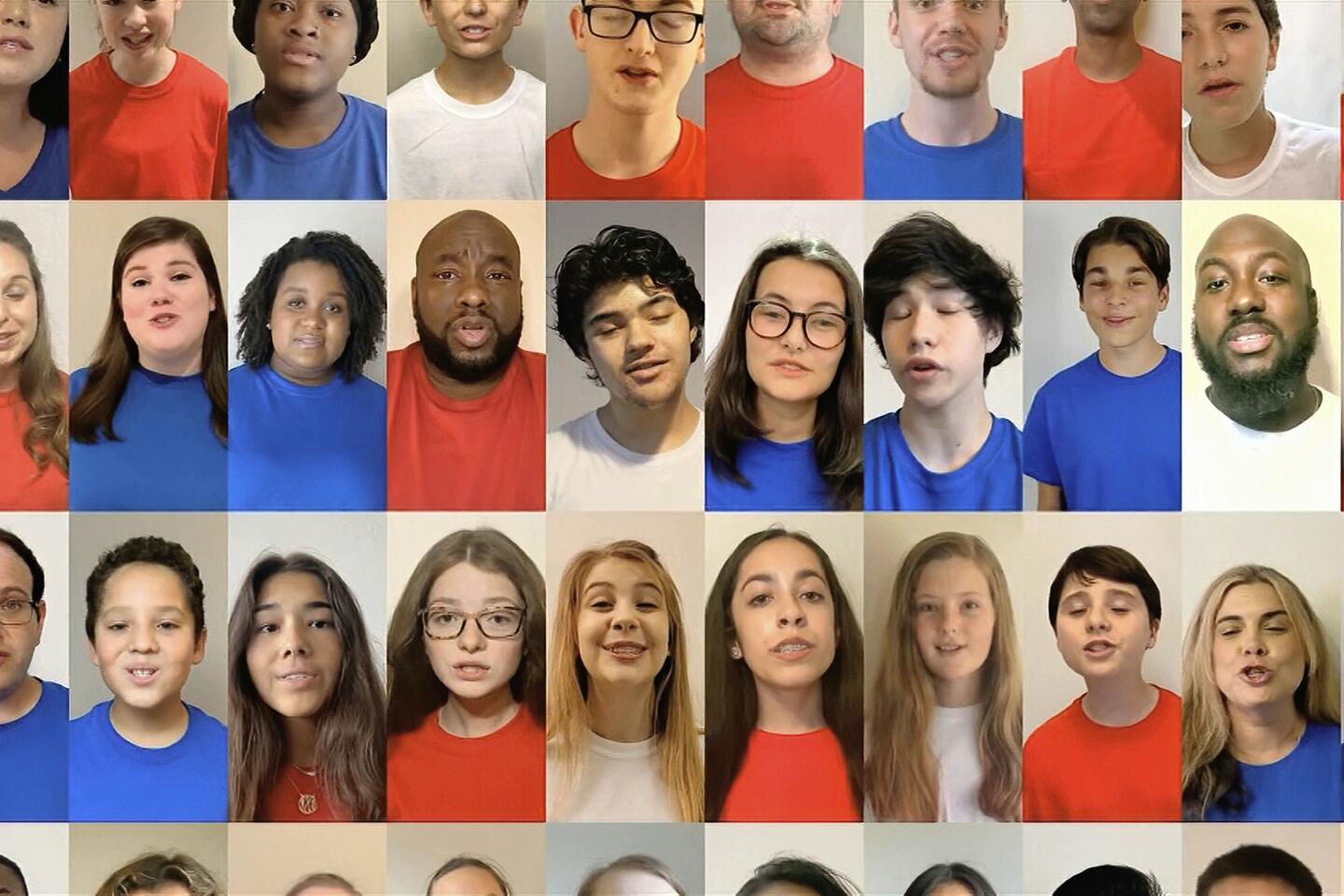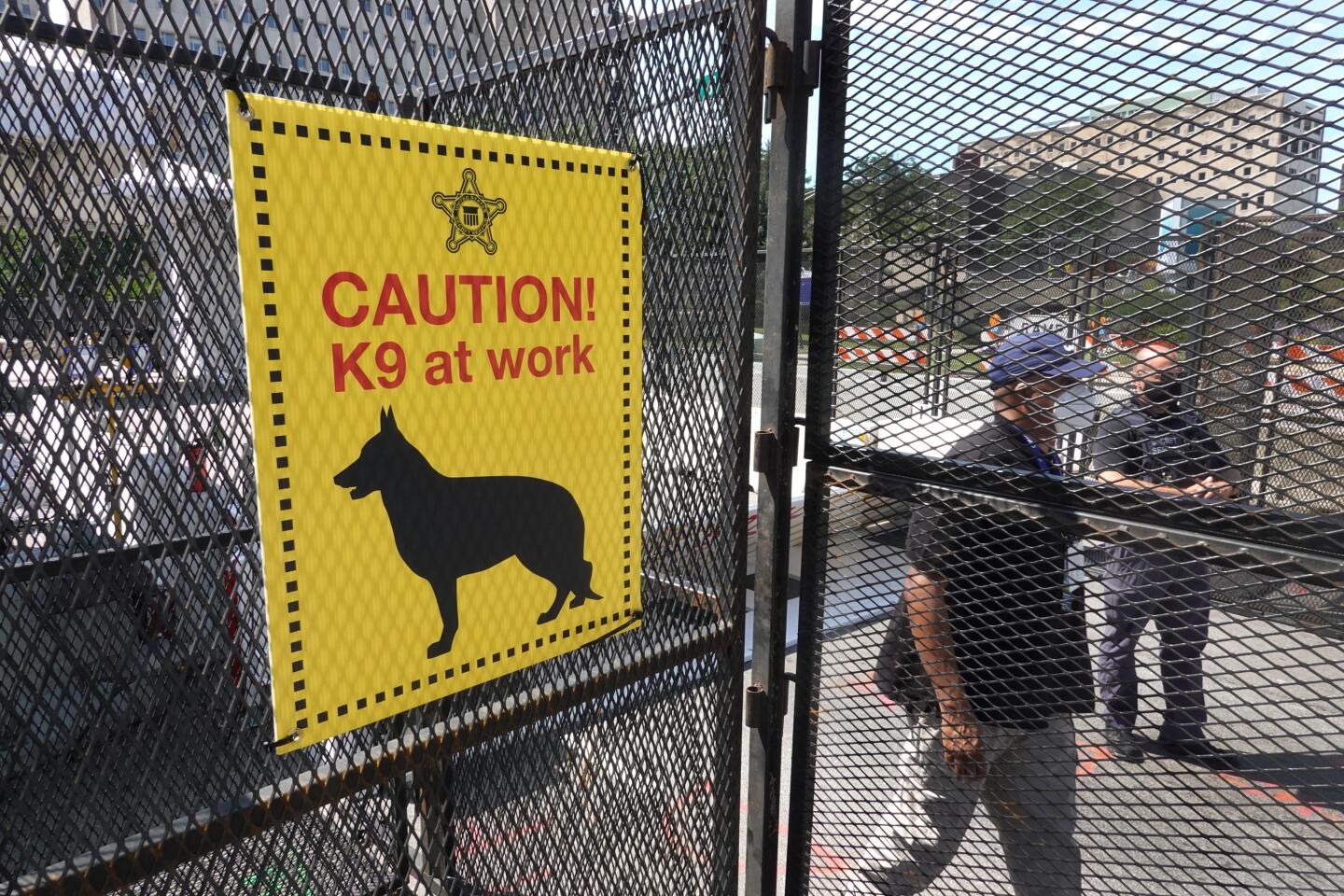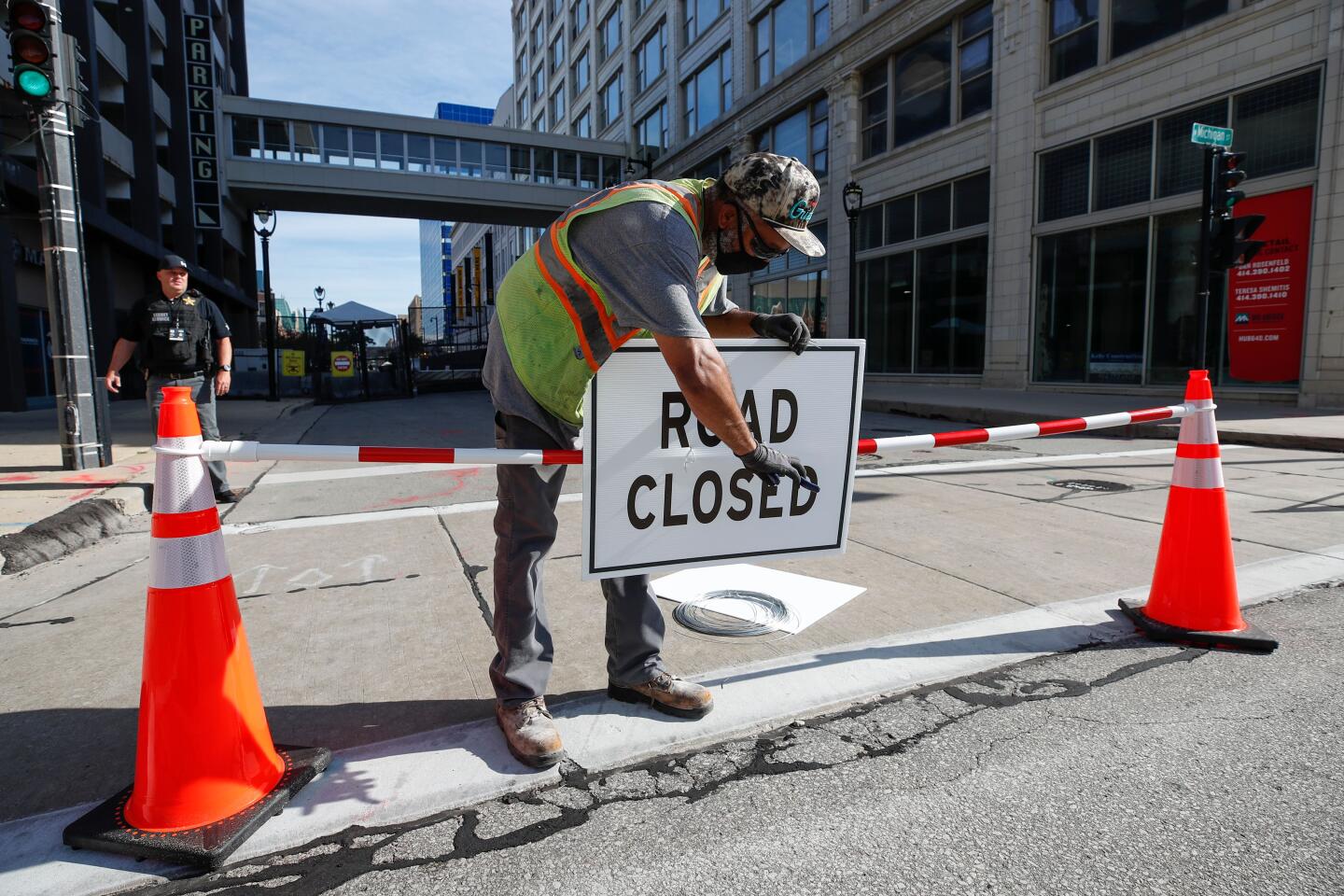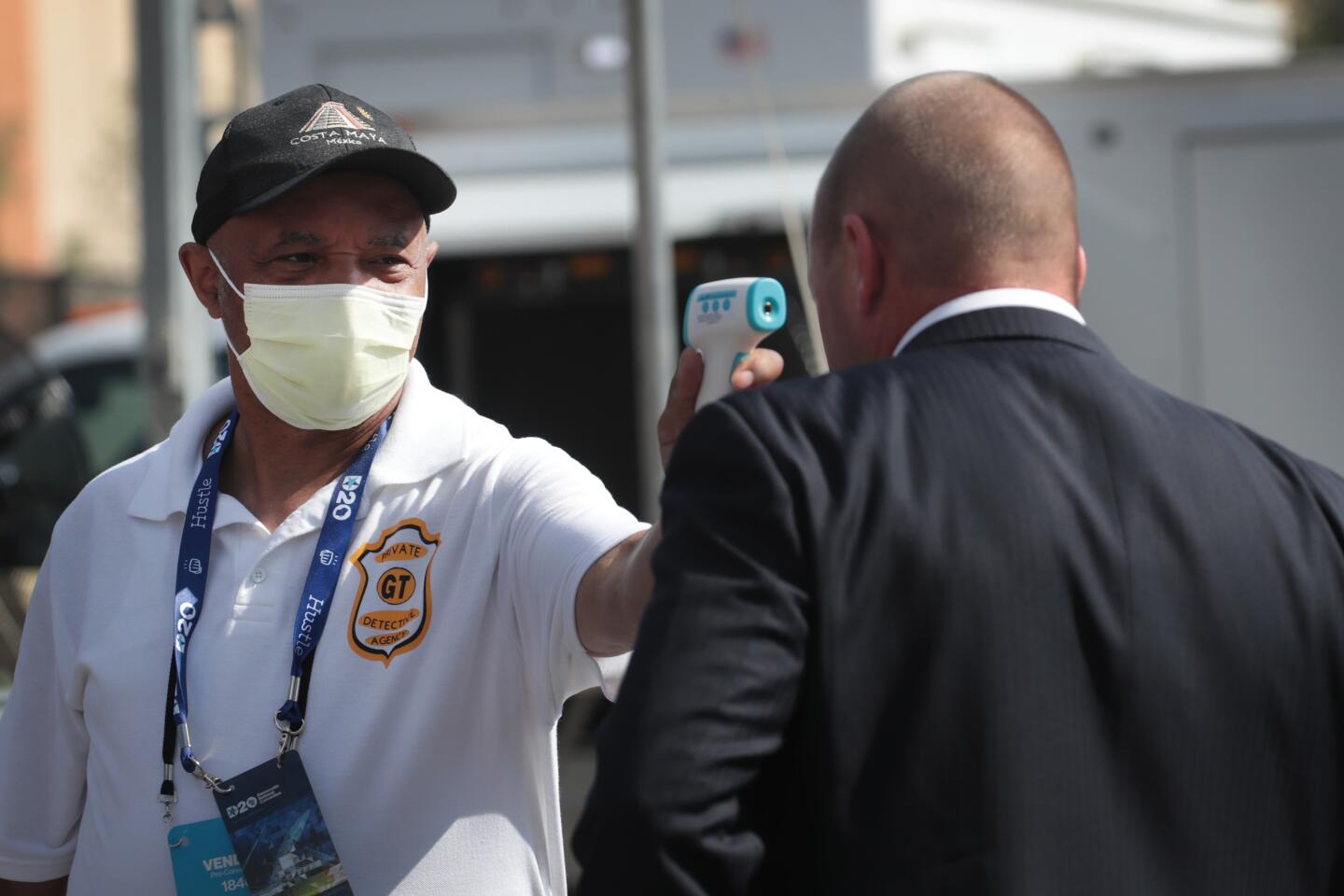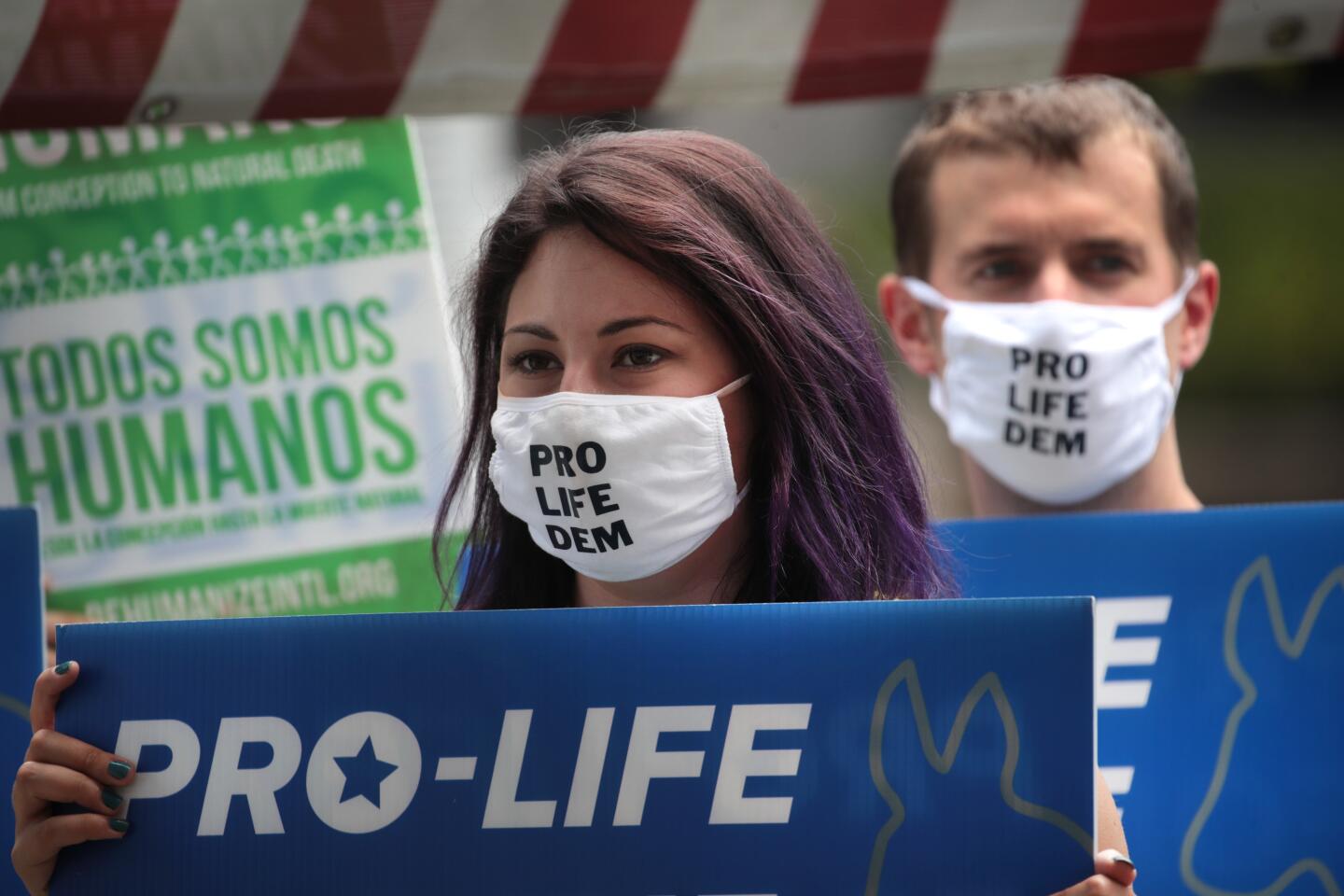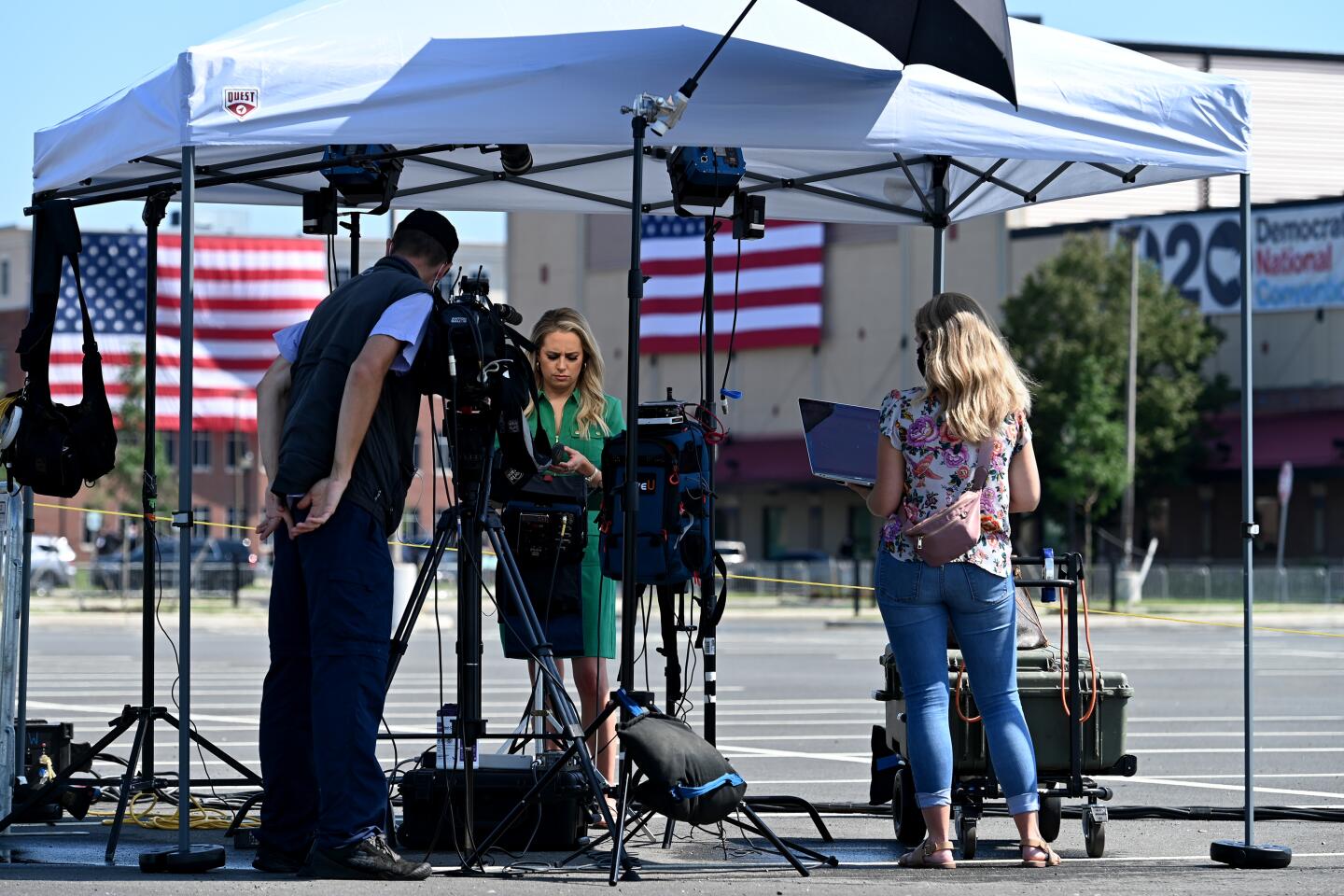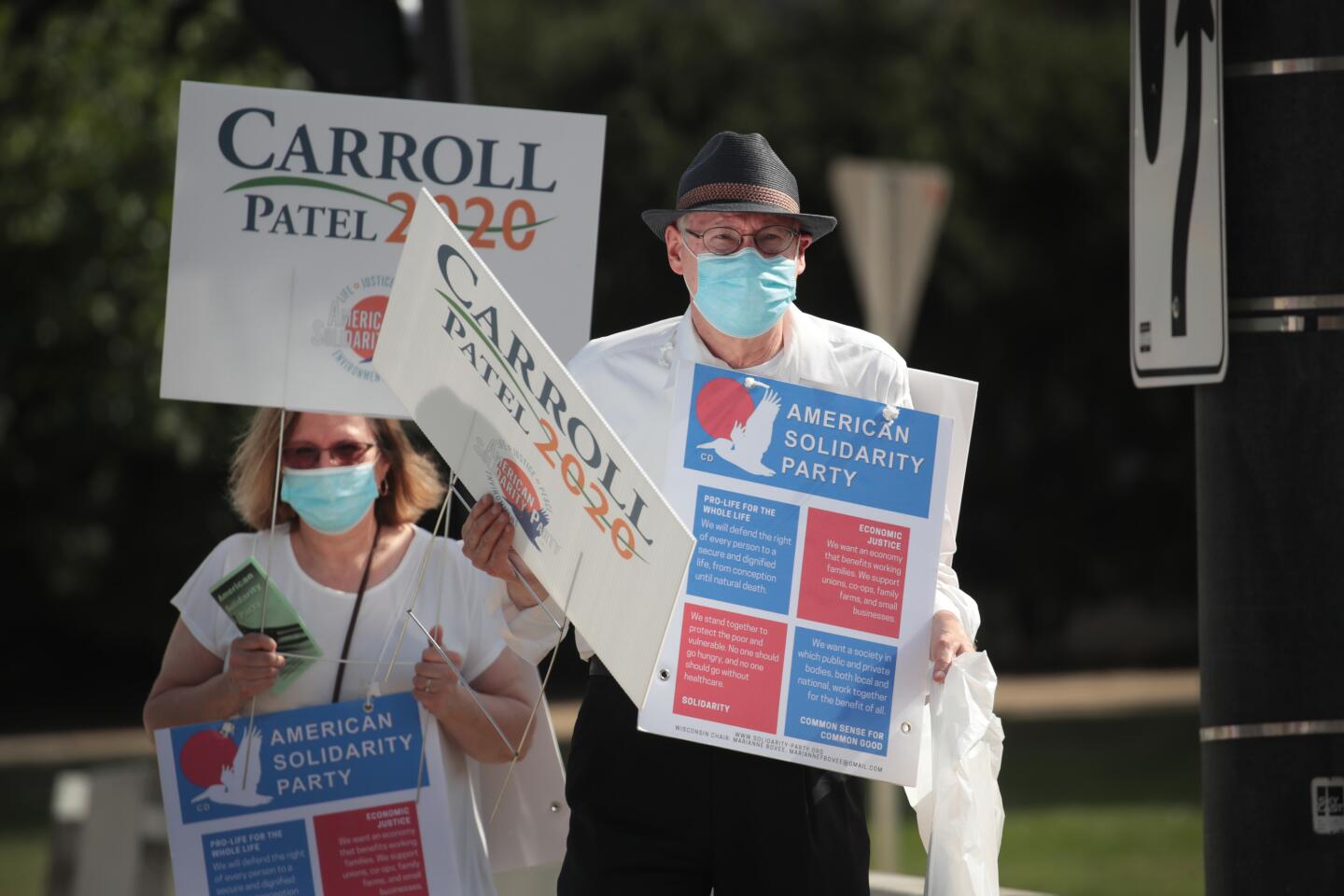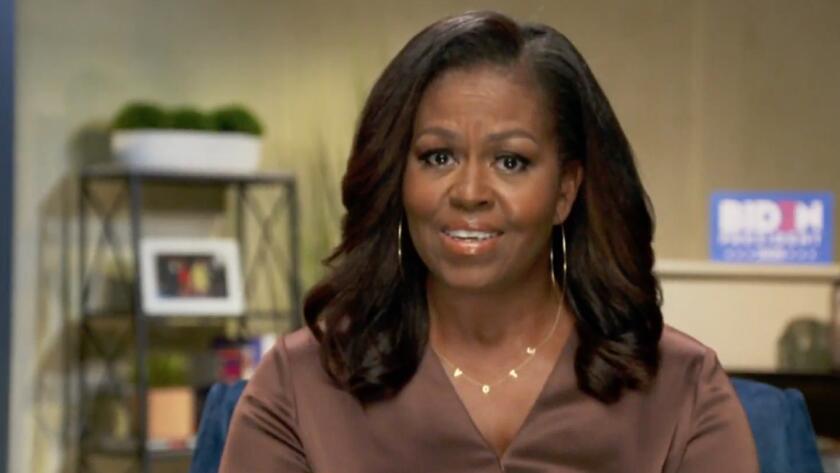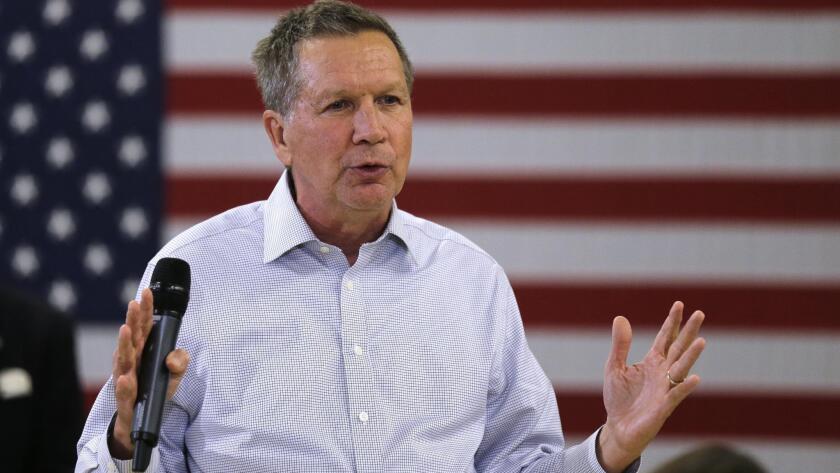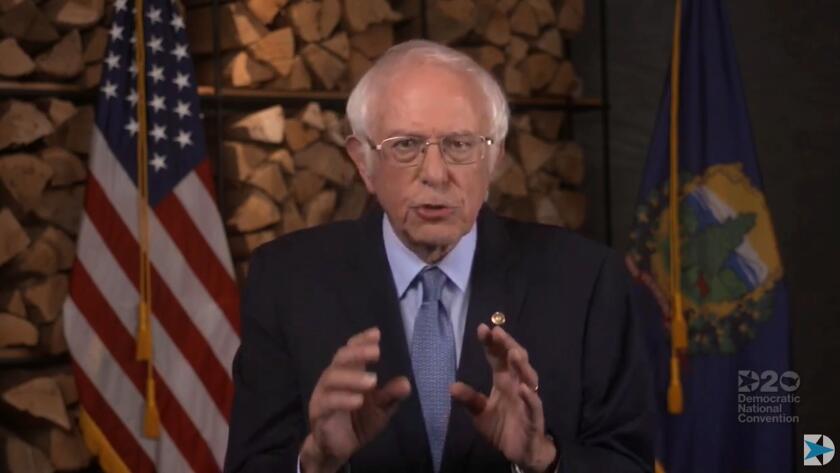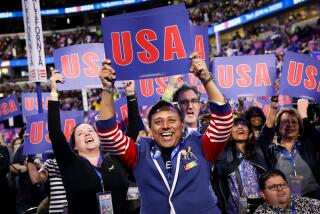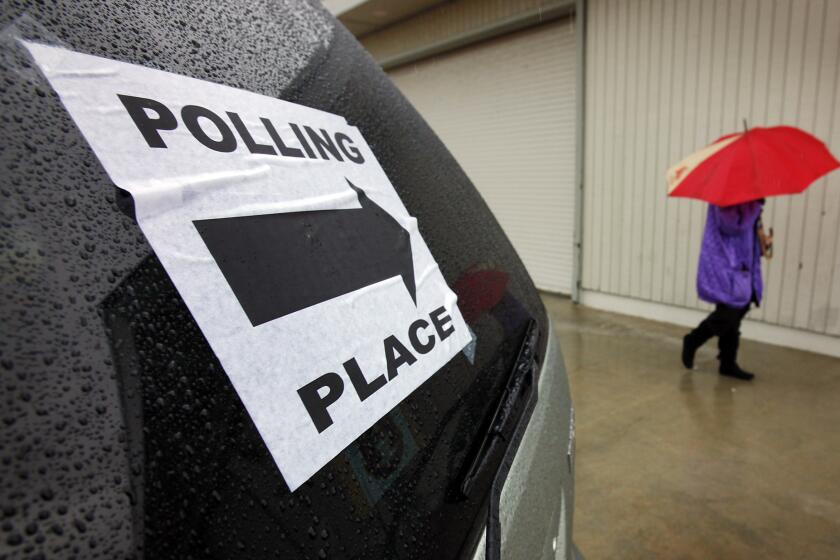5 takeaways from the first night of the Democratic National Convention
Is it really a convention without swarms of delegates in funny hats? Democrats endeavored to find out on Monday, kicking off their four-night nominating convention, an all-virtual affair with only the most tenuous of ties to its host city of Milwaukee.
With an overarching theme of unity, the evening bounced around various lines of attack against President Trump’s handling of myriad crises: the coronavirus pandemic, the country’s racial strife, the struggling U.S. Postal Service.
Here’s what you need to know about the first night of the Democratic convention:
Pandemic precautions
This certainly wasn’t the kickoff that Democrats envisioned when they announced last year that they’d convene in Wisconsin, a state the party was stunned to lose in 2016. Instead of a raucous return to the Badger State, Democrats were scattered in a socially distanced manner across the nation for the week of nominating festivities.
But in an era of work meetings via Zoom and sports games played in empty stadiums, the most noteworthy part of the lack of in-person action was how relatively normal it all seemed.
Sure, there were no cheering crowds (and thankfully, no artificial applause piped in), but the benefits of the new setup were readily apparent with the tightly scheduled programming and COVID-conscious messaging.
“We had hoped to gather in one place, but instead we figured out a safe and responsible way to come together to share our ideas and talk about the future of our country,” said Eva Longoria, the actress who served as an emcee throughout the proceedings.
The coronavirus pandemic remained a major focus for most of the night, including a searing condemnation by Kristin Urquiza, whose father, a Trump supporter, died from COVID-19.
“His only preexisting condition was trusting Donald Trump — and for that he paid with his life,” she said.
Michelle Obama’s blunt talk
In 2016, Michelle Obama used her convention speech to frame the Democratic response to Trump and the GOP: “When they go low, we go high.”
Four years later, the former first lady’s speech will best be remembered for another pithy line: “It is what it is.”
That was her conclusion after making a simple and lacerating assessment of Trump’s presidency: the wrong man for the wrong time.
“He cannot meet this moment. He simply cannot be who we need him to be for us,” she said.
Michelle Obama says vote for Joe Biden “like our lives depend on it.”
Her five-word fatalistic summation of Trump’s abilities echoed the president’s own words in an interview with Axios two weeks ago when he was pressed on the rising death toll of the pandemic.
“It is what it is,” he said then, hastening to add the administration was doing everything it could.
Obama remains one of the most revered figures in Democratic politics, and her speech demonstrated why some in the party had pined for her to be Biden’s running mate, despite her well-known distaste for politics.
In her post-White House life, she has made voter registration her focus, and her remarks centered on the straightforward plea that Americans participate in the election, even if it means enduring long lines or other obstacles.
“If you think things cannot possibly get worse, trust me, they can,” she said, “and they will if we don’t make a change in this election. If we have any hope of ending this chaos, we have got to vote for Joe Biden like our lives depend on it.”
After the speech’s conclusion, Longoria said plaintively to Obama: “You are what we miss.”
Former First Lady Michelle Obama’s prepared remarks for the first day of the Democratic National Convention on Aug. 17, 2020.
Welcome to the party, Republicans
Party-crossers aren’t unprecedented in political conventions — anyone remember former Democratic vice presidential nominee Joe Lieberman making an appearance at the 2008 Republican convention for his dear pal John McCain?
But Democrats devoted an unusually large chunk of prime time to members (or ex-members) of the GOP, in a bid to show wobbly Republican voters that they wouldn’t be alone in rejecting their party.
Former CEO and California gubernatorial hopeful Meg Whitman derided Trump’s economic know-how, stating that “Donald Trump has no clue to run a business.” Former New York Rep. Susan Molinari made an affirmative case for Biden, calling the former vice president “a really good man.”
The longest address came from former Ohio Gov. John Kasich, whose clashes with Trump date back to their rivalry in the 2016 presidential campaign, who acknowledged that in normal circumstances, he’d never be a featured speaker at the Democratic convention.
“I’m proud of my Republican heritage,” Kasich said, extolling the party’s historical ties to Abraham Lincoln. “But what I have witnessed these past four years belies those principles.”
He was followed by testimonials of everyday Republicans pledging to vote for Biden. The message to GOP-leaning voters was clear: If you make the leap to voting for Biden, you won’t be alone.
Lifelong Republicans, including former Ohio Gov. John Kasich, took to the virtual stage during the Democratic National Convention Monday to share why they’re putting their support behind Joe Biden in November.
Bringing together the Democrats
In these COVID times, the Democratic primary feels approximately 42 years ago. But it was just four months ago that Joe Biden became the last candidate standing from a sprawling field of contenders.
Bringing along backers of those other candidates will be essential for Biden’s general election prospects, so the campaign gave ample airtime to his former rivals to extol their nominee.
“It’s not easy to unite the Democratic party. We’re a rambunctious group,” said Washington Gov. Jay Inslee, one of the many presidential hopefuls last year.
Perhaps no endorsement is as crucial on this front than that of Sen. Bernie Sanders, the progressive standard-bearer who ran on a platform of Medicare for all, free college tuition and other policies that stand to the left of Joe Biden’s platform.
Scarred by the fissures between progressives and moderates in 2016, both Sanders and Biden — and their allies — made an effort to ensure that Democrats would hold together in November.
In his speech, Sanders claimed victory in shaping the debate — one he can rightfully make as Biden embraces the $15 minimum wage and other elements of the Vermont senator’s campaign planks.
“If Donald Trump gets reelected, all the progress we have made will be in jeopardy,” Sanders said.
He also dropped one of the most succinct assessments of the president’s tenure: “Nero fiddled while Rome burned. Trump golfs.”
Vermont Sen. Bernie Sanders addresses the Democratic National Convention.
A high-wire act on racial justice
In a year where masses of Americans took to the streets to protest police killings of Black people and racial injustice more broadly, there was no way that race would not be brought up in the Democratic proceedings.
Perhaps there’s no better time politically to broach the issue directly; polling indicates enduring public support for the Black Lives Matter movement and the need for progress on race relations.
The most meaningful moments were the most personal ones. Two brothers of George Floyd, the man who died after being pinned by the neck by a Minneapolis police officer, led a moment of silence for Black Americans lost to police violence and other killings. Gwen Carr, mother of Eric Garner, who died because of a police chokehold in 2014, spoke in a roundtable about holding politicians’ feet to the fire, as Biden pumped his fist in approval.
But the discussion also underscored how delicate the topic can be, particularly when it comes to the role of police. Other participants in the conversation guided by Biden included Chicago Mayor Lori Lightfoot, who has come under criticism from local activists for backing up the police department in their recent clashes with protesters.
Also participating was Houston Police Chief Art Acevedo, who spoke for the need of national reforms, but the inclusion of law enforcement may not sit well with progressive advocates who have made “Defund the police” a policy goal that is defined in different ways by various proponents.
More to Read
Get the L.A. Times Politics newsletter
Deeply reported insights into legislation, politics and policy from Sacramento, Washington and beyond. In your inbox three times per week.
You may occasionally receive promotional content from the Los Angeles Times.
